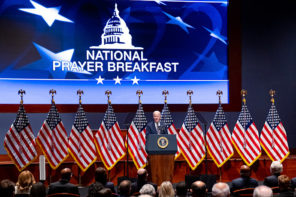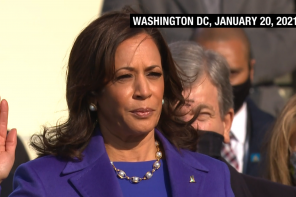Church and state watchdogs are celebrating a federal court decision today that ruled the congressionally mandated National Day of Prayer proclamations unconstitutional.
In her ruling today, U.S. District Judge Barbara Crabb of the Western District of Wisconsin wrote that the purpose of the federal law:
is to encourage all citizens to engage in prayer, an inherently religious exercise that serves no secular function in this context. In this instance, the government has taken sides on a matter that must be left to individual conscience.”
Congress established the day in 1952. Since 1988, the first Thursday in May presidents have traditionally issued proclamations asking Americans to pray. The Freedom From Religion Foundation, a Madison-based group of atheists and agnostics, filed suit arguing the day constituted an establishment of religion and violated the First Amendment.
Americans United for Separation of Church and State issued a news release in which it noted some interesting words from our founding fathers regarding prayer proclamations:
Thomas Jefferson, for example, refused to issue prayer proclamations, observing, “Fasting & prayer are religious exercises. The enjoining them an act of discipline. Every religious society has a right to determine for itself the times for these exercises, & the objects proper for them, according to their own particular tenets; and this right can never be safer than in their own hands, where the Constitution has deposited it.”
James Madison, considered the Father of the Constitution, issued a few prayer proclamations at the behest of Congress during the War of 1812. But he later wrote that he regretted the move.
Governmental religious proclamations, Madison observed, “seem to imply and certainly nourish the erroneous idea of a national religion.” He warned that there would always be a tendency “to narrow the recommendation to the standard of the predominant sect.”
The National Day of Prayer had been scheduled for May 6. The entire ruling can be read here. Christian conservatives, including the organization National Day of Prayer, have not yet weighed in. I’m not a psychic, but in anticipation of their reaction, it’s probably worth stressing that nothing in the ruling prevents citizens from praying. It only prohibits the government from sanctioning National Day of Prayer.




